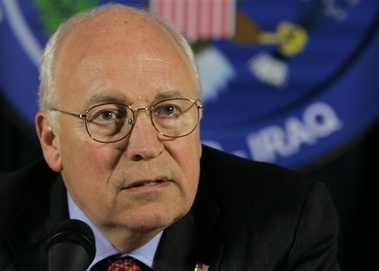切尼就安全问题对伊拉克领导施压
BAGHDAD - Vice President Dick Cheney said Wednesday that "we've got a long way to go" in reducing violence in Iraq in a trip punctuated by an explosion that shook windows at the US Embassy, where Cheney was visiting.
 Vice President Dick Cheney holds a press availability with Gen. David Petraeus, commander of the US forces in Iraq, and US Ambassador to Iraq Ryan Crocker, both not pictured, in Baghdad, Iraq Wednesday, May 9, 2007. [AP] |
As Democrats clamor for an end to the four-year-old war and President Bush sags in the polls, the White House is under intense political pressure to show that Prime Minister Nouri al-Maliki's government is making progress. Cheney urged Iraq's leaders to do more to reduce violence and promote political reconciliation.
White House counselor Dan Bartlett said in Washington that Cheney's trip "gives an opportunity at a very high level for this message to be delivered."
Eight days after Bush vetoed a bill setting deadlines for US troop withdrawals from Iraq, the White House also served notice that Bush would veto a follow-up bill drafted by House Democratic leaders that would pay for the Iraq war only into summer. At the same time, Defense Secretary Robert Gates held out hope that troops can begin withdrawing if the Iraqi government makes progress by fall.
Supporters of radical Shiite cleric Muqtada al-Sadr rallied in Baghdad and Shiite areas to the south to protest the Cheney visit and demand the withdrawal of American forces. Protesters in Baghdad and the holy city of Najaf chanted "No to the occupation" and "No to America."
Baghdad was Cheney's first stop on a weeklong trip to the Middle East to seek support from moderate Arab leaders for help in bringing stability to Iraq. The vice president, joined by Gen. David Petraeus, the top US commander in Iraq, and Ambassador Ryan Crocker, met with Iraqi political and military leaders.
"I emphasized the importance of making progress on the issues before us, not only the security issues but also on the political issues that are pending before the Iraqi government," Cheney said.
Earlier, the vice president appeared with al-Maliki, and the prime minister said they had discussed "the challenges that we are facing in our own political process. ... The meeting with the vice president put the foundation for practical steps in order to support our efforts working on both the security front as well as the domestic political issues."
Cheney spent most of the day at the US Embassy inside the heavily protected Green Zone in central Baghdad. He was in the building when an explosion rattled windows and prompted officials to move reporters accompanying Cheney to the basement for several minutes. Witnesses said a mortar or rocket appeared to have been fired from the mostly Shiite areas on the east side of the Tigris River toward the Green Zone.
The vice president, at a news conference a half hour later, did not mention the blast. He had been wearing an armor-plated vest when he got off his plane at the airport.
Cheney said that Iraqi leaders felt sectarian violence was "down fairly dramatically" even though car bombings and suicide attacks still claim a heavy toll. "I think everybody recognizes there still are serious security problems, security threats, no question about it. But the impression I got from talking with them ... is that they do believe we are making progress, but we've got a long way to go."
Separately, Cheney's spokeswoman, Lea Anne McBride said, "His business was not disrupted (by the explosion). He was not moved."
In February, a suicide bomber attacked the main gate of the US-run Bagram Air Base in Afghanistan while Cheney was staying there after having been stranded by a snowstorm. The vice president was rushed to a bomb shelter but was not injured.
That explosion killed 23 people, including two Americans, and delivered a propaganda blow that undercut the US military and the weak Afghan government it supports.
The vice president's visit came two days after Bush held a video conference with al-Maliki about the need to move forward on political reconciliation among the majority Shiites, the Sunnis and the Kurds. Al-Maliki's aides said the prime minister had reassured Bush he was pushing to meet benchmarks but noted that disbanding militias would take time.




 手机网站
手机网站